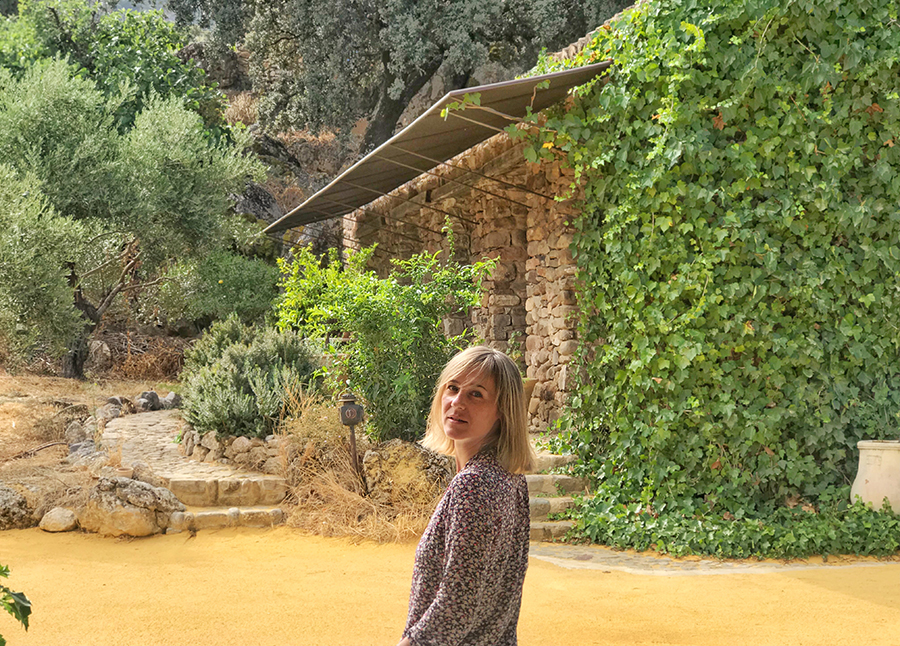You learn a lot about bees, horses, chickens and sheep in La Donaira. You find unusual plants mixed in with your salads. You hear the silence or the birds chirping, but more than anything you rediscover the pleasures of the simple, the natural, the biological and ecological, the authentic, and all that we thought had disappeared.
La Donaira could be described as an eco retreat that’s based on the philosophy of love for nature invites guests to enjoy an old way of life, together with forgotten experiences, a return to the quiet life and the chance to rediscover the pleasure of simple tastes.
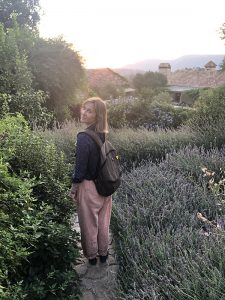
As it aims to become one of the top sustainable luxury retreats in Europe, the Andalusian farm has made ecology its philosophy. Design, art, horses, nature and music are some of the charms of Spain’s most eco-chic country farm.
Lookout Pro had the opportunity to interview Sophie Gravier, Project Manager of La Donaira and learn more about this Andalusian farm hotel which has been labelled by international critics as one of the best luxury eco-retreats in the world.
Sophie, you’re the Project Manager of La Donaira. Tell us a lit bit about how you came to La Donaira and what’s your relationship with the project.
I first discovered La Donaira about 10 years ago, around the time the project began. I was invited to a few evening events, and I fell in love with the project. Then 3 years ago, I was offered the chance to run the first edition of the Pause Festival, a series of outdoor concerts, recitals and improvisations.
I left my other job after the festival and started to work with the La Donaira team full time. I now manage several projects on the farm, along with other projects more focused on regenerative agriculture and the marketing and distribution of our products.
How did the idea of creating a luxury eco retreat with only nine rooms, an organic farm and an equestrian centre come about?
It all began with a special love for Lusitanos, which are considered the oldest saddle horse in the world. The farm is set in a privileged location with the most exceptional biodiversity in Europe, and that’s why we chose La Donaira to house the first 30 Luisitanos (we now have more than 80).
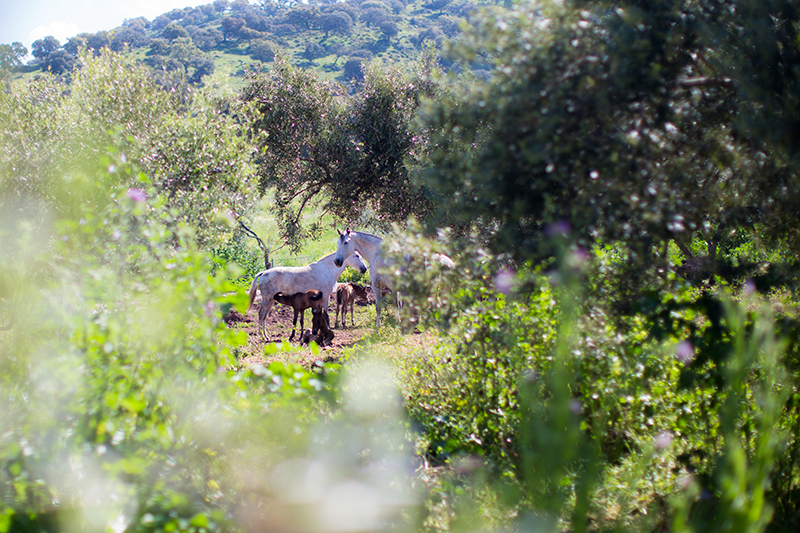
We thought it was impossible to create a new lifestyle where animals, people and the soil live together in the same harmony that existed hundreds of years ago. Working with the land has healing power – for both the soil and the people.
Don’t get me wrong, we have nothing against the modern world. We’re simply trying to make the most of its advantages and sidestep its problems and disadvantages.
The house is designed in the form of a retreat. We’ve gone to great lengths by mixing bio construction and technology with a highly thought out interior design with huge windows that allow nature to form part of the interior of the house. We have a spectacular spa that can be enjoyed in winter – for example, you can take a dip in the indoor infinity pool while looking out over the snow-covered mountains.
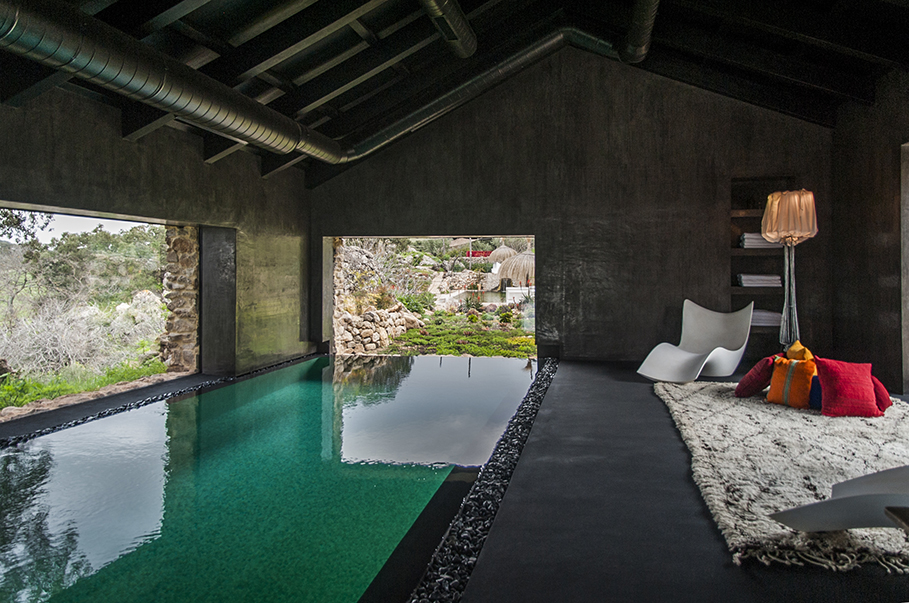
We started out with 9 rooms, and our idea was to create an intimate atmosphere that people could share and get to know each other, while at the same time having a sense of space and privacy.
Part of the project is intended to raise awareness and share, and the demand is growing. We learn a lot from our guests, and we’re always working on something new without having anything firmly fixed in our minds. We’re now working towards building a second house on our land to cater for the demand.
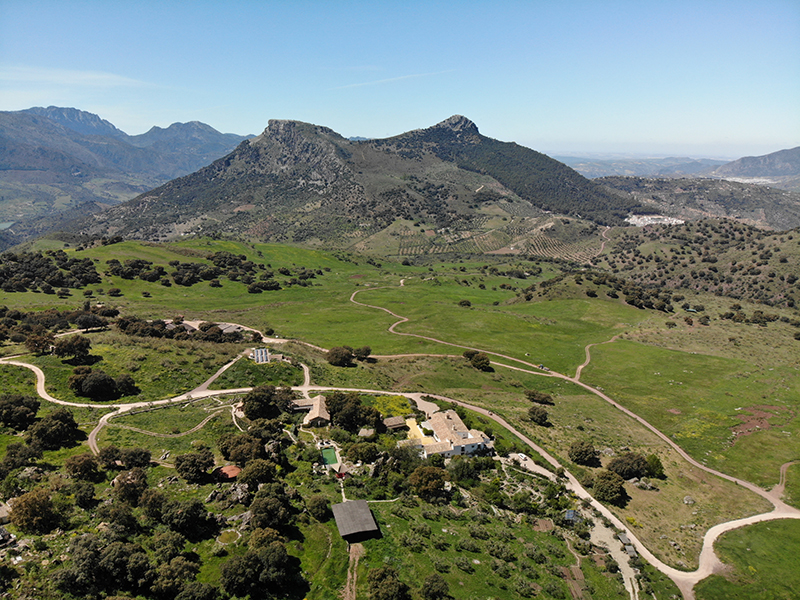
The soil is part of our three-pronged approach (people, animals and soil), and we believe our choice of food can become a change initiative. 90% of our food comes from our farm, and the remainder is sourced from local producers. We also produce our own wine, but we’re also open partial to the incredible natural wines that exist in Spain, France or Austria, to name just a few.
To put it another way, we’ve created our own ideal world.

What type of guest is La Donaira for?
Without falling into a cliché, I’d say that it’s aimed at all people who want to discover a way of life that’s more respectful towards the environment. It’s a new type of luxury that I think is booming, where we take the time to eat, read, learn, enjoy, listen to music, walk, etc. The famous “slow travel”.
La Donaira is a commitment to sustainable and green tourism and offers visitors a unique experience in an incredible location. What can guests expect when staying at La Donaira?
To take the time to awaken their senses. To rest and take a break from it all, and to learn and enjoy the simple things in life. We also offer a wide range of activities. Many of our guests plan trips and excursions away from the farm before they arrive, but 90% of them cancel them the day after they arrive as they don’t want to leave La Donaira.
We try to offer activities related to our philosophy. To give you an example, one of the activities that attracts a lot of attention is our bee bed. The prototype of the bed was designed in collaboration with Jonathan Powell, a beekeeper we work with.
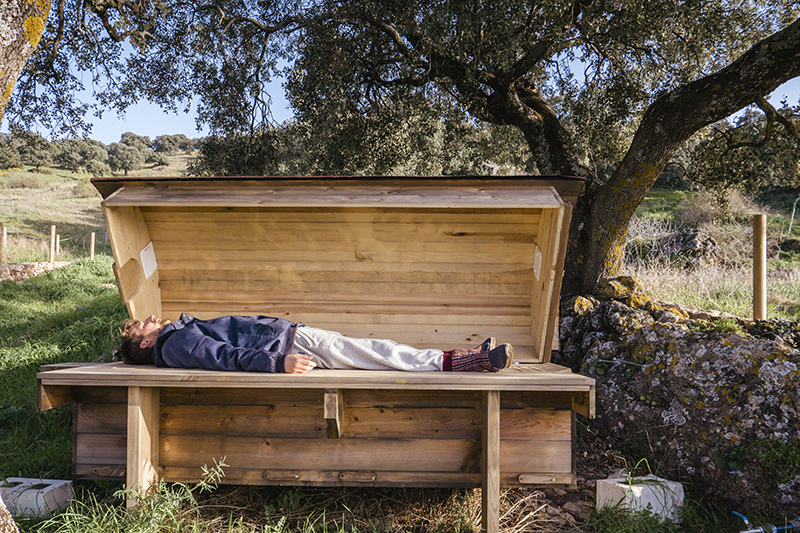
Guests and visitors can get closer to the wonderful world of bees by lying on a bed with 4 hives (about 100,000 bees) underneath. The bed is covered so no bees can get in and guests also wear a protective suit, so it’s totally safe. All you have to do is lie down and listen to the sound of 100,000 bees buzzing. The immersion has healing powers, and it’s an amazing experience.
It’s just one example, but as you can see, it’s a way of raising awareness (in this case the extinction of bees) with something that very few people in the world have had the chance to experience.
What nationalities have stayed at La Donaira so far?
We’ve had guests from many different countries. Many people come from the UK, USA, Scandinavian countries, Austria, Germany, France and lately a lot of people are coming from Canada and Brazil too. We also have Spaniards (Madrid, Barcelona, Basque Country and people from the Costa del Sol who come for a weekend break).
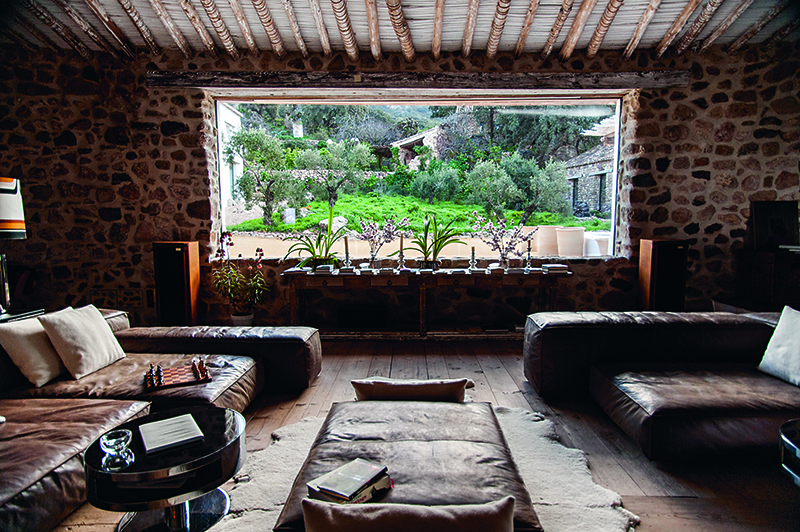
Europeans usually come for a long weekend. Others who come from further afield tend to stop here for a few days when travelling between Seville and Granada, or even Madrid and Barcelona sometimes.
4-5 days is the ideal length of time to stay.
What have your guests highlighted most after their experience at La Donaira?
It’s different for every person. Our food and wine are obviously big hits with slow food fans. For those who come to go horse riding, it’s our Lusitanos and discovering/learning about natural horsemanship, otherwise known as horse whispering, or our introduction into equine therapy.
Others come to go hiking or mountain biking. People who are starting to grow their own fruit and veg come to learn permaculture techniques and draw inspiration from our concepts of regenerative gardening. And some just come just to kick back and relax, enjoy the spa, or read by the pool.
I think what children like the most is going out to collect their own eggs and interacting with the other farm animals.
At Donaira, guests are accommodated in “all-inclusive sustainable luxury”, and all three meals are prepared in the company of the guests. These “introduction” evenings with culinary suggestions from international chefs, natural wines from our farm and craft beer often lead to interesting chats among people from all over the world. Why did you choose this format?
We’re now in the midst of an economic and spiritual crisis in a society where it’s becoming difficult to communicate with anyone unless we’re doing it through a screen. This can be both good and bad of course, but we want to offer something different, where human contact is more direct and more transparent.
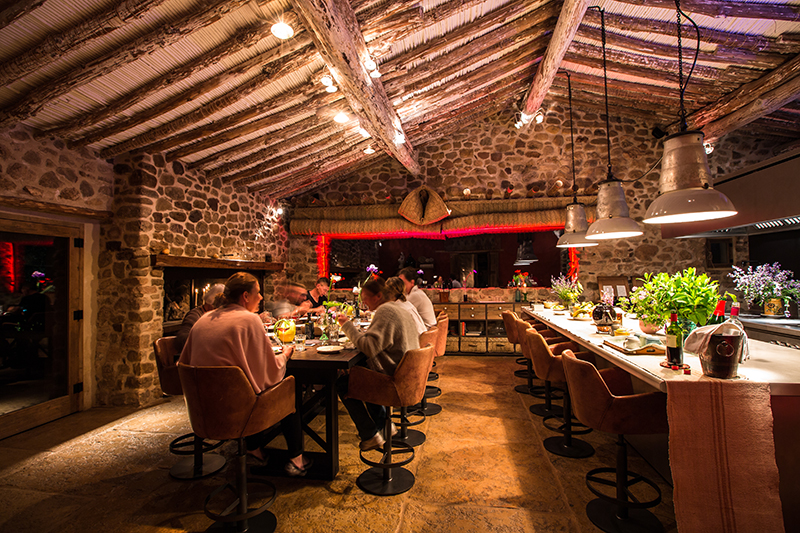
Our guests were a bit surprised at first (we always give them the possibility of having lunch or dinner at a separate table), but most people are more than happy to participate. It’s interesting to see how people react to having a face to face conversations as if it was something new. But, as you said, the most amazing thing is seeing the conversation flowing and people laughing after a glass or two of good wine.
How can your guest choose the dishes or the menu at La Donaira? Is there a specific seasonal menu, or does it vary daily? Who does the cooking?
When people make the reservation, we ask them if they have any allergies, intolerances, if they’re on a diet, or if there’s something that they don’t want to eat. We’re living in a world where we’re forced to make countless decisions every day, and we want them to forget about the menu or the wine and let themselves get carried away by seasons and the creativity of our chef.
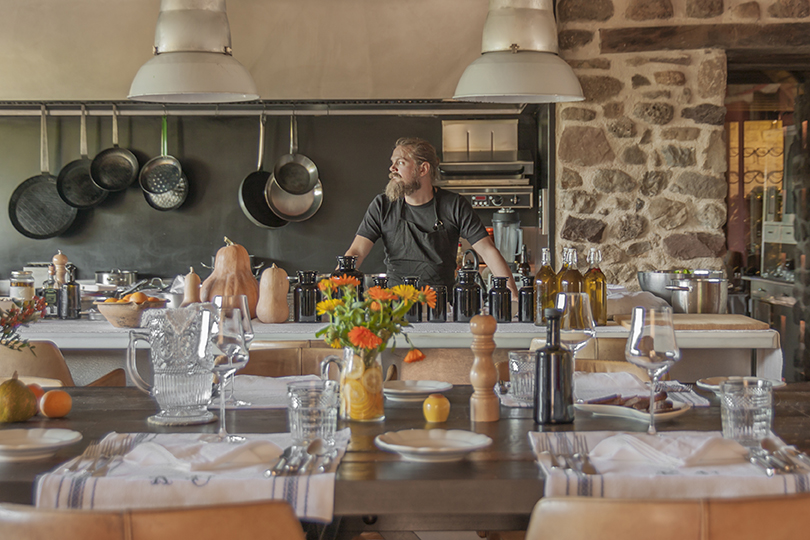
Fredrik Andersson is responsible for cooking and identifies himself with the farm-to-fork social movement. Every day, he speaks to Andrew, who manages and designs our fruit and veg gardens, to see what can be harvested. And he’ll also have spoken to Ortega, our farm manager, a few days beforehand. Our food is (mainly) vegetarian, but above all it’s local, responsible and seasonal.
You’ve also held private events and weddings at La Donaira, what’s the maximum capacity you can cater for? What type of celebrations are the most requested?
Yes, it’s true, we offer the possibility of booking the entire property for private events. Weddings and birthdays are the most popular, but we also have some seminar-type business trips. Weddings usually last 3 days.
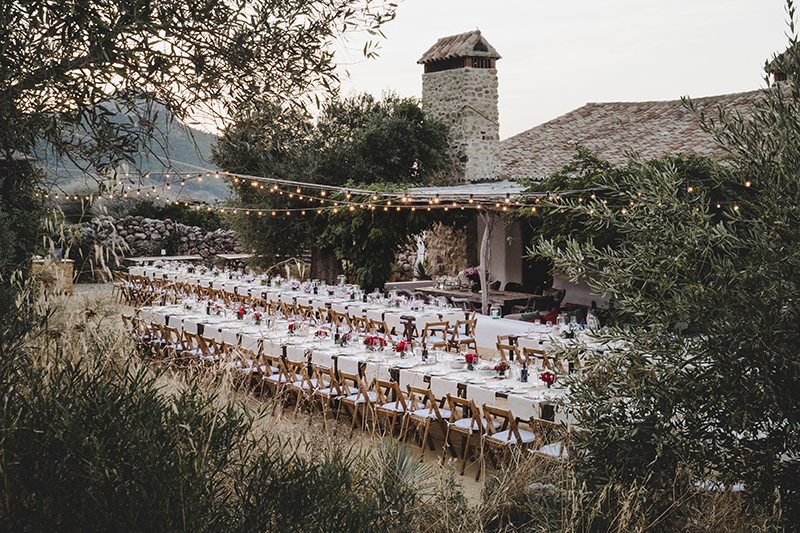
La Donaira can accommodate up to 23 people (some of our rooms are duplex). And we can accept up to 120 diners for celebrations. We recommend other places for people who are not staying at La Donaira, and we organise all the transfers for them.
What activities can guests enjoy during their stay at La Donaira?
Outdoor sports (hiking, paragliding, cycling, horse riding, attending a horse whispering demonstration, etc.), yoga classes and meditation with our yogi, Paula. We also offer guided visits of our farm to see the animals and learn more about La Donaira’s approach to organic farming. We have other more unusual experiences like the bees’ bed or workshops on how to make non-toxic candles using our beeswax.
And in the evening, after dinner, our guests can enjoy our stargazing experience and get to have a closer look at the moon, Jupiter or the rings of Saturn, with our Celestron CPC 800 telescope.
La Donaira also has a team of volunteers from all over the world living on the farm, enjoying the natural environment and doing a few hours work each day. How did this idea come about?
Sustainability wouldn’t be possible without the transfer of knowledge. The WWOOF (World Wide Opportunities on Organic Farms) is a cultural and educational program that we are involved in. It’s a way for the volunteers to form part of the ecological movement. And for us, sharing and showing people what we’re building is one of the branches of our wish tree. The learning is mutual.
Volunteers can work with the horses, in the medicinal garden, the hotel, on the farm. What’s the La Donaira work philosophy?
The volunteers contribute to the different parts of the project you just mentioned.
They work 6 hours a day, five days a week. In exchange, they learn about sustainable methods, enjoy local, seasonal food and have accommodation provided during their stay. They usually stay between 3 months and 1 year. And in some cases, they’ve become full-time paid employees.
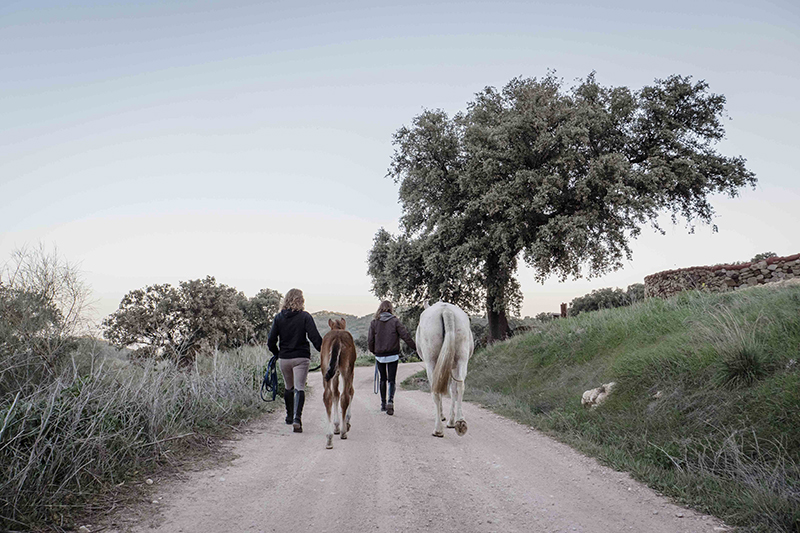
We’re a very dynamic international team, and we’re all here because we love the project. We’re learning and developing new ideas every day. Traditional companies usually focus on vertical growth, whereas when I try to describe La Donaira or my work, I open my hands and lay them out flat. This is a project with a thousand different branches that all grow at the same time in the image and likeness of our farm. I don’t think there’s any other project like it in the world.
La Donaira project is certified organic. It includes ongoing plans to repopulate the ecosystem with birds and bees and also factors in a large medical herb garden. How did the idea of this garden arise? Can the guests learn about the different plants and their properties?
The medicinal garden, which is located just below the house, acts as the green lung of La Donaira. It was modelled on medieval monastery gardens which served as living pharmacies, and has more than 300 types of healing, and edible herbs and flowers that perfume and beautify the house and surroundings.
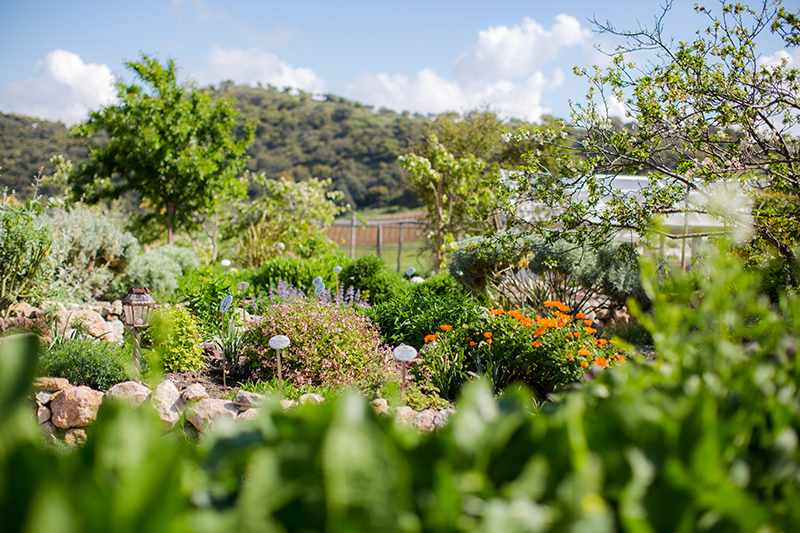
We use the plants and flowers in the garden in cooking and for making herbal teas every day.
Gerhard, the brains behind the garden, decorates the house and garden to the rhythm of the 4 seasons. Living and ephemeral art is present in every corner, and every room. All the guests are welcome to participate in a guided tour of the garden to learn more about the unique holistic permaculture approach we have in place at La Donaira.
“You can solve all the world problems in a garden” (Geoff Lawton)
And finally, for those that are still not convinced, why visit la Donaira?
It’s difficult to answer this question without repeating myself. We wanted to create a refuge for a committed public to imagine a new way of life surrounded by olive and almond groves, organic fruit and veg gardens, horses and bees, art and music, and to invent a new mindset that would make us managers of life instead of its predators.
And for those who are still hesitant, well, we invite you to come and stay with us for a few days and participate in this change.



